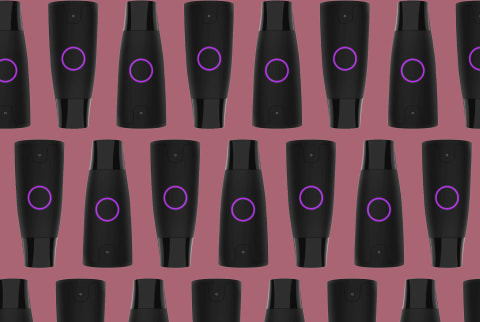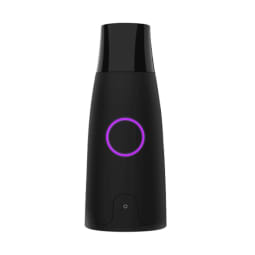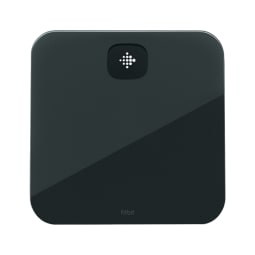Advertisement
The Best Metabolism Trackers Of 2025 To Keep Your Body Functioning At Its Best (Lumen, Aria Air Review)



Realize it or not, your body is working day and night to consume and use energy. Metabolism is the process your body undergoes to turn what you eat and drink into energy you store or use, and we rely on it to perform basic bodily functions, such as breathing, digesting, and maintaining our hormone levels.
The best metabolism trackers give you insights into how fast or slow your body burns calories into energy.
Your body uses energy at all times and relies on converting energy to conduct basic body functions. Your metabolism is directly connected to your digestive system, nervous system, circulation, organ function, and breathing.
By studying your metabolism, you'll be able to further understand how your body processes energy, using this knowledge to balance your hormones, maintain a healthy weight, and improve your general well-being. There's a lot to unpack with metabolism trackers, so we spoke with experts, researched the brands on the market today, and dove deep into the pros and cons of each.
Below, find our list of the best metabolism trackers of 2024—plus, learn how to identify a slow metabolism and what to do about it.
The best metabolism trackers
Signs of a slow metabolism
Several factors come into play when determining whether you have a fast or slow metabolism. Your basal metabolic rate (BMR) is the amount of energy your body needs to survive and perform its daily functions. Your RMR is the actual number of calories your body burns while at rest. Knowing both will give you a better idea of your metabolic health.
Someone with a slow metabolism typically burns calories at a slower rate. This means more of their energy is stored than is used. Your general lifestyle, physical activity, sleep, and genetics will all impact your metabolism.
Not sure whether your metabolism is fast or slow? Consider these signs of a slow metabolism:
Weight gain that sticks: Since your body burns calories much more slowly with a slow metabolism, the nutrients and energy from the food you eat aren't used as efficiently as they are by someone with a fast metabolism. If you find that even when implementing a healthy diet and exercise routine, you still gain weight that sticks, you may have a slower metabolism.
Blood sugar imbalance: Spikes and dips in your blood sugar levels can greatly impact your day-to-day life. Side effects include headaches, fatigue, mood swings, and craving sugary or processed high-carb foods, such as chips or cookies.
Hormone level imbalance: Some people are born with imbalanced hormone levels. Others may develop this over time as they age. If you've noticed a change in your skin or your hair is starting to thin, these may be signs of hormonal imbalance.
What is a metabolism tracker?
A metabolism tracker can be used to provide insight into how your body is consuming and using its energy. Instead of waiting to see your doctor or mailing in an at-home metabolic test, you can keep track of your metabolism regularly, on your own time.
Though the technology is still developing, if you want to track your metabolism at home, there are a few options available.
If you don't mind doing a little math, you can use the Mifflin-St. Jeor Equation3. This equation was created to determine the number of calories your body burns when it is at rest—your resting metabolic rate (RMR)—which, keep in mind, is different from your BMR.
However, you can get a close estimate of your BMR by using this equation. It involves calculating your height, weight, and age, with separate equations used for males and females.
For those seeking a simpler option, that's where metabolism trackers come in. These trackers come in the form of smartwatches, smart scales, and Breathalyzer devices and are all fairly simple to use.
Who should use a metabolism tracker?
A metabolism tracker is a great option for those looking to gain a better understanding of their general health or potential health concerns.
As we said, your metabolism is intertwined with nearly every function of your body, so you can really benefit from the knowledge of how your body processes, stores, and uses energy.
If you have experienced these concerns or circumstances, consider tracking your metabolism:
- Excessive weight gain or obesity
- Weight loss and maintenance
- Inherited metabolic disorders
- Hormonal imbalance
Julius Cermak, naturopathic wellness expert, says anyone looking to lose weight and increase their energy level can benefit from using a metabolism tracker. "It is particularly useful for those who have a slow metabolism, as tracking their caloric intake and physical activity can help them identify ways to improve it," he explains.
That said, metabolism trackers aren't for everyone. Many at-home metabolism trackers require an investment, not only from your wallet but from your time as well. This may not be your best option if you don't have the budget to invest in a metabolism tracker or the time commitment to using one. If you are concerned about a major health issue, please see your doctor, as using a tracker cannot detect serious health problems.
How we picked
Quality
The quality of a successful metabolism tracker lies in its ability to perform well with accurate results. We want to share products that have a high success rate and add value to the time and money you've invested in them.
Cost
On the low end, some metabolism trackers are less than $100. Others can cost a few hundred dollars. We keep budgets in mind so that more people are able to own and use these trackers.
Ease of Use
Finding a metabolism tracker that is simple to use and still offers value is an important factor we considered when selecting our top products.
Accuracy
With any at-home metabolism tracker, there is going to be some room for error. However, we choose trackers that have been tested, vetted, and proven to provide accurate measurements and results.
Our picks for the best metabolism trackers of 2024
Pros:
- Easy for daily use
- Mobile app to record and track your results
Cons:
- Must use every day for 1 month to determine your flex score
- App requires a monthly subscription
Testing method:
Breath testMetrics measured:
CO2 concentrationAn at-home metabolism tracker meant for everyday use, the Lumen measures the CO2 concentration of your breath. Although there is a slight learning curve when first using the Lumen, users have found it easy to use as time goes on. Its breathalyzer design is sleek and subtle and easy to toss in your pocket or bag. Keep in mind, you’ll need to use this consistently for at least one month to determine your flex score—so its portable size definitely comes in handy.
To gain access to the brand’s mobile app for viewing and tracking your results, you’ll need to pay for a monthly subscription. There are three subscriptions to choose from and you can cancel at any time. The app also boasts advice, recipes, and customizable daily plans to help you reach your goals.
With nearly three thousand ratings, the app has a 4.6 out of five-star rating overall in the Apple store. Family physician, Dr. Molly Maloof, M.D., says, “What’s really great about Lumen is that all it requires of you is to breathe and it gives you information that traditionally would take a lot of time and effort to receive.”
Pros:
- Easy to use
- Affordable for those on a budget
- Compatible with Fitbit devices and app
Cons:
- Does not provide real-time metabolism data
- Delay in sync between devices
Testing method:
ScaleMetrics measured:
Weight and BMI (body fat percentage)The Aria Air smart scale from Fitbit is a great companion tool if you already own a Fitbit smartwatch and use the app to track your goals—but this isn't necessary to benefit from this device. Aside from functioning as a scale, it gathers information to determine your body fat percentage. By sending bio-electrical signals through your body, it can calculate your BMI and determine your body fat percentage along with your lean mass.
Users find this scale easy to use and enjoy the way it syncs with smartwatches and the Fitbit app. That said, some reviewers mention a lag in syncing information between devices. Another qualm is that the scale does not provide any real-time information regarding your metabolism. Instead, it focuses on weight loss and weight management.
Advertisement
How to choose a metabolism tracker
As technology advances and more trackers enter the marketplace, there are some key elements to consider.
Goals: Keep your personal health goals in mind. One metabolism tracker may be better suited for someone focused on weight loss or weight management, while another might work best for someone focused on optimizing their gut health.
Professional health care advice: Some metabolism trackers are equipped with mobile apps to provide you with more access to information and assistance. Within these platforms, you may find access to accountability communities, coaches, and medical professionals who can share more insight and knowledge regarding your health.
Cost: For at-home devices, prices can range from $50 to several hundred. Consider your budget, needs, your commitment to using the tracker, and how it will aid you in your health and wellness journey.
Can you measure your metabolism?
Measuring your metabolism is a great way to gather information about how your metabolism is working and at what rate. You can visit your doctor to get a basic metabolic panel (BMP), which is typically performed through a blood test.
This test provides information about your electrolyte levels (including sodium and potassium) and can also evaluate kidney function by checking creatinine and blood urea nitrogen (waste products that are filtered through the kidney). Keep in mind that you may need to fast before getting blood work done to make sure the results are accurate.
With the advanced technology today, you have the option of using an at-home metabolic test, which saves you a trip to the doctor or lab. At-home metabolic tests require either blood or saliva to be gathered and then mailed to a laboratory. From there, you'll want to discuss any abnormal results with a medical professional.
FAQ:
What is the best device to track metabolism?
The best metabolism tracker is one that will meet your health needs and budget and provide value in your wellness journey. We recommend taking a look at some of the devices listed in this article or speaking to your health care provider for more information.
How can I track my metabolism?
Track your metabolism by seeing your doctor to conduct a BMP blood test or using an at-home metabolism test or tracker. All methods allow you to gather information regarding how your metabolism functions and performance.
How do you check if your metabolism is fast or slow?
Aside from testing your metabolism, evaluate your physical activity, age, body composition, as well as your hormonal levels. These factors, plus your genes, will influence your metabolism.
The takeaway
Properly tracking your metabolism gives insight and knowledge about how your body processes and uses energy. This type of analysis can help detect health issues and determine if any further health care is necessary.
If you're committed to bettering your health and are willing to put in the time, check out our picks for the best sleep trackers, fitness trackers, and HRV monitors.



















